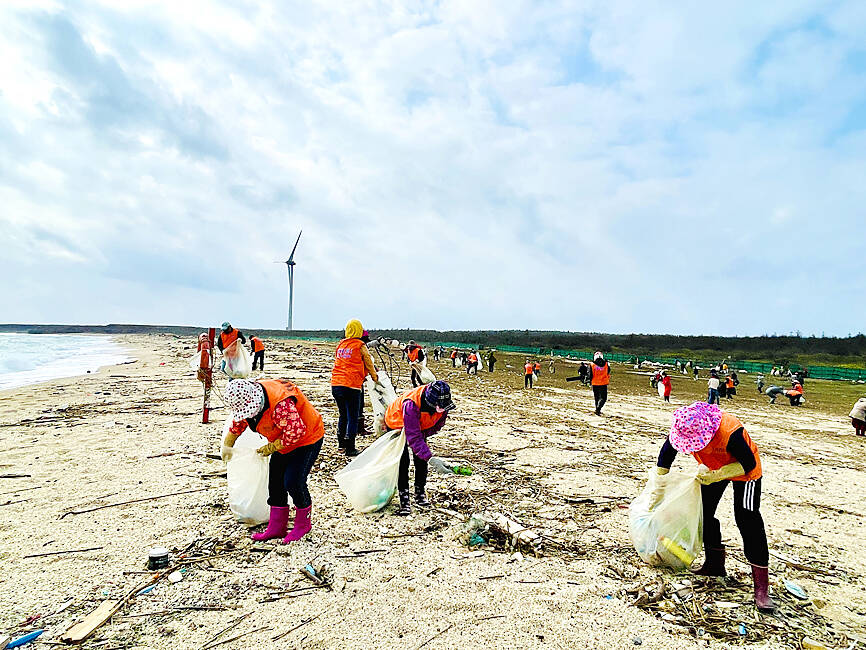Littering along Taiwan’s coasts decreased 33 percent last year, an Environmental Protection Administration (EPA) report released on Tuesday last week showed.
About 955 tonnes of litter was collected on beaches last year — 33 percent less than the 1,426 tonnes collected in 2021, the agency said, adding that it was the third consecutive annual drop in coastal litter.
The report, titled “2022 Project of Promoting and Maintaining Clean Coasts and Performance Management: Rapid Assessment and Source Analysis,” said only 5 percent of the total was collected along the east coast.

Photo courtesy of the Penghu National Scenic Administration via CNA
The section of the west coast spanning Changhua, Yunlin and Chiayi counties, and Tainan accounted for 26 percent, followed by 11 percent collected in Kaohsiung and Pingtung County, it said.
The most heavily polluted coasts were in Kinmen County, which contributed 14 percent to the total, while Penghu County accounted for 10 percent and Lienchiang County for 7 percent, it showed.
The report was commissioned by the EPA and conducted by Taiwanese environmental consultancy IndigoWaters, which offers services and advice to governments on the management of coastal and ocean pollution.
IndigoWaters CEO Yen Ning (顏寧) said that litter from the fishing industry made up 59 percent of coastal garbage on Taiwan proper.
The report highlighted the origins of plastic bottles and cans, sampling 500 pieces of litter collected at random from 10 coastal garbage hot spots, Yen said, adding that it also assessed how long they had been at sea.
Categorizing them as originating from Taiwan, China or elsewhere, the report said that Chinese bottles and cans accounted for 95 percent in Kinmen, Yen said.
In Pingtung, Yunlin and Chiayi, 58 percent were Taiwanese bottles and cans, she said.
Eighty-six percent had been at sea for less than three years, Yen added.
Local governments should schedule beach cleanups and recycling events based on local industries and seasonal weather patterns, Yen said.
For example, byproducts of the oyster industry in Yunlin, Chiayi and Tainan are typically carried southwest from July to September, she added.

An essay competition jointly organized by a local writing society and a publisher affiliated with the Chinese Communist Party (CCP) might have contravened the Act Governing Relations Between the People of the Taiwan Area and the Mainland Area (臺灣地區與大陸地區人民關係條例), the Mainland Affairs Council (MAC) said on Thursday. “In this case, the partner organization is clearly an agency under the CCP’s Fujian Provincial Committee,” MAC Deputy Minister and spokesperson Liang Wen-chieh (梁文傑) said at a news briefing in Taipei. “It also involves bringing Taiwanese students to China with all-expenses-paid arrangements to attend award ceremonies and camps,” Liang said. Those two “characteristics” are typically sufficient

A magnitude 5.9 earthquake that struck about 33km off the coast of Hualien City was the "main shock" in a series of quakes in the area, with aftershocks expected over the next three days, the Central Weather Administration (CWA) said yesterday. Prior to the magnitude 5.9 quake shaking most of Taiwan at 6:53pm yesterday, six other earthquakes stronger than a magnitude of 4, starting with a magnitude 5.5 quake at 6:09pm, occurred in the area. CWA Seismological Center Director Wu Chien-fu (吳健富) confirmed that the quakes were all part of the same series and that the magnitude 5.5 temblor was

The brilliant blue waters, thick foliage and bucolic atmosphere on this seemingly idyllic archipelago deep in the Pacific Ocean belie the key role it now plays in a titanic geopolitical struggle. Palau is again on the front line as China, and the US and its allies prepare their forces in an intensifying contest for control over the Asia-Pacific region. The democratic nation of just 17,000 people hosts US-controlled airstrips and soon-to-be-completed radar installations that the US military describes as “critical” to monitoring vast swathes of water and airspace. It is also a key piece of the second island chain, a string of

The Central Weather Administration has issued a heat alert for southeastern Taiwan, warning of temperatures as high as 36°C today, while alerting some coastal areas of strong winds later in the day. Kaohsiung’s Neimen District (內門) and Pingtung County’s Neipu Township (內埔) are under an orange heat alert, which warns of temperatures as high as 36°C for three consecutive days, the CWA said, citing southwest winds. The heat would also extend to Tainan’s Nansi (楠西) and Yujing (玉井) districts, as well as Pingtung’s Gaoshu (高樹), Yanpu (鹽埔) and Majia (瑪家) townships, it said, forecasting highs of up to 36°C in those areas